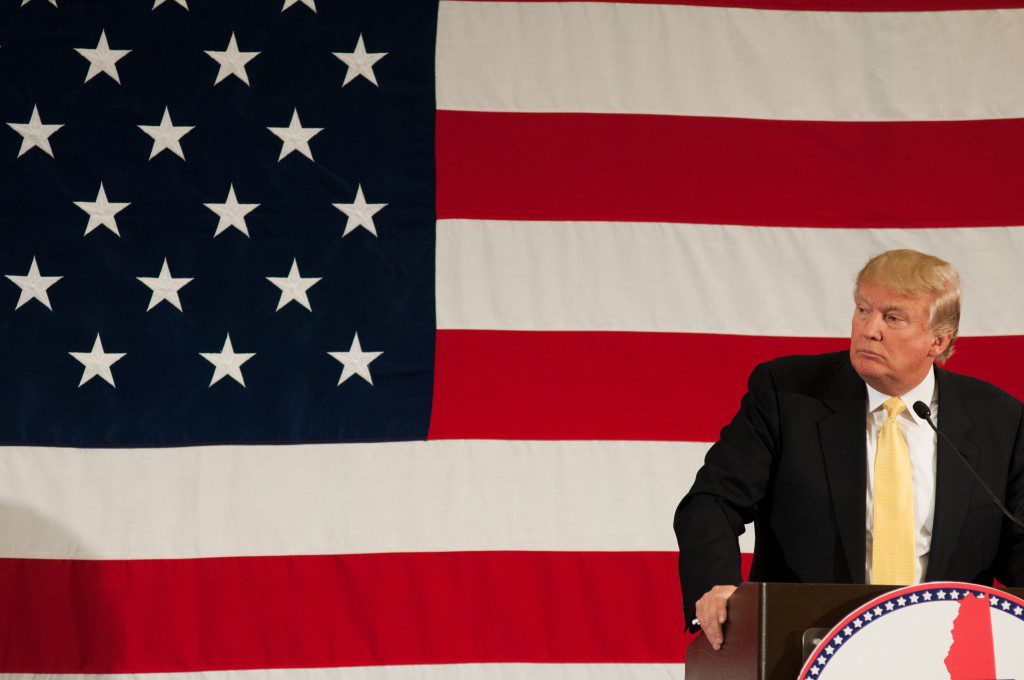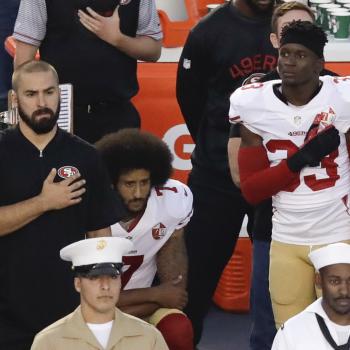By Rabbi Francis Nataf.

An American acquaintance recently told me that there is only one question every Israeli was asking him on his last visit—what’s with America and Trump? Like him or not, Donald Trump has captured the world’s imagination in a way very few have done before. Almost consciously setting himself up as a buffoon and a ruffian, he has nonetheless become a very serious contender for the world’s most powerful office.
In response, an army of pundits has struggled to explain how this candidate no one initially took seriously has taken America by surprise. Some have pointed to deep-seated frustration with an economy that has left many, especially blue-collar workers, out in the cold. That is one of the better explanations, but it doesn’t account for everything. For one, it fits the Sanders campaign better than Trump’s. But as opposed to Sanders who has put financial abuses at the center, Trump’s rallying cry has been about “Americanism.” In one line, his message has been that you don’t have to make room for people and values that threaten middle America. For many, this apparently struck a deep chord. But perhaps even more effective than the message was its political incorrectness; meaning it was the type of thing that many people believed, but felt that they were not being allowed to express.
But popular as it was in some quarters, Trump’s message was bound to cause outrage in others. One of the favorite strategies of the more extreme anti-Trump forces is to brandish him as a fascist, going so far as to compare him to Hitler. Surely, that comparison is rarely taken seriously. Nor should it. But there is one aspect of the comparison that deserves more thought, something I call the Nietzschean reaction.
Here I am not concerned about the linkage or lack of linkage between Nietzsche and Nazism. What does interest me is a common set of circumstances that led to both, and I believe also responsible for much of the popularity of Donald Trump. To understand this, some background is in order: Within the context of the separation between body and soul often found in Christian thinking, Enlightenment philosophers stressed a new dichotomy between mind and emotion. They accordingly linked progress with rational thought’s control and subjugation of man’s emotions and intuitions. But they were soon followed by the Romantics who rose up in rebellion against such a move. The latter countered with the championing of human subjectivity and emotion. Since that time, Western intellectual history has often expressed itself as a type of war between those two basic inclinations.
Eventually, Nietzsche became emblematic of the Romantic rebellion against the institutions and thinking championed by the Enlightenment. What is important here is less what he said then what led him to say it. His was an entirely natural response to the smothering of an important side of man’s very identity. Treating men exclusively as minds and treating their world as a realm of objective thought will inevitably bring a strong reaction.
America is neither 19th-century Germany nor early 20th-century Germany. But what it does share is an increasing sense of a nation that feels it has been given over to the “experts,” and that these experts operate in an artificial world of objectivity. In the words of Yale University’s David Gelernter, “Many philosophers and scientists today tend to dismiss the subjective… ignore it, or they announce that, actually, it doesn’t even exist.”
More than anything else, Trump has come to the defense of the average American’s subjective world. And by doing so, he has set himself up as the enemy of those that have “announced that such a world doesn’t even exist.” In fact, just about everything he says and does can be understood as an attack against experts that have pushed too many people into denying their own truths.
There are many possible reactions to the smothering of man’s inherent subjectivity. Nazism was a particularly cancerous one and the American version is thankfully a very distant relative. But the popularity of Nazism, like the popularity of Trump, would never have occurred had society not veered in such an unbalanced direction to begin with.
So where does this leave us? If we have to choose between the dry objectivity of a Kant or the wild subjectivity of a Nietzsche, it is hard to know which one is worse. Two great rabbis actually weighed on this question. For Rabbi Soloveitchik, it was no contest. Having witnessed the Holocaust, he wrote that when subjectivity was given free rein, it “brought complete chaos and depravity to the world.” Yet Rabbi A. Y. Kook—who did not see the Holocaust—tipped his hat in the other direction, describing a Nietzschean-style will to personal greatness as intrinsic to the ideal man.
But both rabbis were discussing societies that have to make a choice. From other things that they wrote, it seems that both knew the opposition that Jewish tradition holds up to such a choice. True, the Chassidic movement and its opponents both emphasized one side of the dichotomy over the other. But classical Judaism has always sought balance between the objective and subjective realms. To me it is clear that this tradition loudly proclaims that to live in one without also living in the other is to be half a person.
The problem is really much larger than the 2016 elections in the U.S. The real problem is a society where one feels more and more obligated to make a choice between one’s mind and one’s heart. As with anything else, symptoms should be addressed. But more critical is dealing with their roots.
Rabbi Francis Nataf is a Jerusalem-based educator, writer and thinker. He is the author of three books of contemporary Bible commentary as well as of numerous articles for Haaretz, the Jerusalem Post, the Times of Israel, the Jewish Press and the Jerusalem Report. He is also associate editor of the Jewish Bible Quarterly. Visit his site at www.francisnataf.com.














